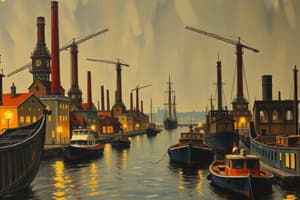Podcast
Questions and Answers
What major change did industrialization bring to the population distribution in Europe during the 1800s?
What major change did industrialization bring to the population distribution in Europe during the 1800s?
- A decline in factory jobs
- Urbanization and movement to cities (correct)
- Decreased urban population
- Increased rural migration
Which conditions characterized the living environment in crowded cities during industrialization?
Which conditions characterized the living environment in crowded cities during industrialization?
- Low population density
- Filth, garbage, and sickness (correct)
- Access to modern housing and education
- Abundant sanitation and clean water
Which group comprised the growing middle class during the Industrial Revolution?
Which group comprised the growing middle class during the Industrial Revolution?
- Industrial factory owners and politicians
- Skilled workers, professionals, and business people (correct)
- Wealthy nobles and military leaders
- Unskilled laborers and farmers
What did Adam Smith and other economists advocate regarding government involvement in business?
What did Adam Smith and other economists advocate regarding government involvement in business?
What was Karl Marx’s perspective on the relationship between factory owners and workers?
What was Karl Marx’s perspective on the relationship between factory owners and workers?
What was the main concern that led to the development of socialist ideas?
What was the main concern that led to the development of socialist ideas?
Which of the following exemplified the negative effects of industrialization in Manchester?
Which of the following exemplified the negative effects of industrialization in Manchester?
What was the primary belief behind utilitarianism as it relates to workers' rights?
What was the primary belief behind utilitarianism as it relates to workers' rights?
What did the term ‘laissez-faire’ refer to in the context of economic practices during industrialization?
What did the term ‘laissez-faire’ refer to in the context of economic practices during industrialization?
What outcome did proponents of capitalism believe would result from unrestricted business operations?
What outcome did proponents of capitalism believe would result from unrestricted business operations?
Flashcards
Urbanization
Urbanization
The movement of people from rural areas to cities, often due to job opportunities.
Slums
Slums
Poor and crowded living conditions in cities, often lacking basic services like sanitation and housing.
Middle Class
Middle Class
A social group consisting of skilled workers, professionals, and business people, who generally enjoyed comfortable lives.
Capitalism
Capitalism
Signup and view all the flashcards
Utilitarianism
Utilitarianism
Signup and view all the flashcards
Socialism
Socialism
Signup and view all the flashcards
Marxism
Marxism
Signup and view all the flashcards
Communism
Communism
Signup and view all the flashcards
Laissez-faire
Laissez-faire
Signup and view all the flashcards
Industrial Revolution
Industrial Revolution
Signup and view all the flashcards
Study Notes
Effects of Industrialization
- Industrialization transformed British life, increasing access to coal, better food, clothing, and cities.
- Urbanization grew as people moved to cities for job opportunities.
- Living conditions in cities were poor, with cramped housing, lack of sanitation, and high rates of illness and accidents.
- Work conditions were harsh, with long hours (often 14 hours a day, 6 days a week) and low pay.
- Many workers were children, with no protections established until 1819.
The Middle Class
- Industrialization improved the lives of some, creating a new middle class.
- This class included skilled workers, professionals, business people, and wealthy farmers.
- The middle class enjoyed comfortable lives and pleasant homes.
Manchester's Changes
- Manchester served as a prime example of industrial changes.
- Rapid growth led to overcrowded and polluted cities (poor air and water quality).
- Factory owners invested and expanded with large profits, creating large homes for themselves.
- Workers, despite long hours, often had few benefits.
Capitalism
- Industrialization prompted new ways of thinking about society.
- Some economists advocated laissez-faire (limited government intervention) and capitalism (individual investment).
- Adam Smith championed this, believing it fostered economic growth and freedom.
- Capitalists invested in business, aiming for profit, with expected overall benefits over time.
- Some opposed worker protections.
Socialism
- Other thinkers challenged capitalist ideals, emphasizing equality.
- Utilitarians believed in practices beneficial to society, aiming to improve worker conditions.
- Socialist thinkers believed a society shared ownership of businesses would equally distribute the benefits of production.
- Socialism evolved from a concern for social justice.
Marxism
- Karl Marx, a German thinker, proposed a form of socialism, known as Marxism.
- Marxism predicted a class struggle ending with a system where workers owned the means of production (called communism).
- Marx's Communist Manifesto, described communist ideas, where the working class controls production.
Studying That Suits You
Use AI to generate personalized quizzes and flashcards to suit your learning preferences.




